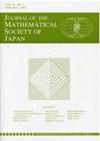关于$a\pmod{pq}剩余阶的密度性质$
IF 0.7
4区 数学
Q2 MATHEMATICS
引用次数: 0
摘要
我们考虑残差类$a\hspace{-.4em}\pmod{pq}$的残差阶(乘法阶)的分布性质。已知残差阶数波动不规则,并且增长非常快。我们感兴趣的是,当我们固定$a$并让$p$和$q$变化时,剩余订单$a\hspace{-.4em}\pmod{pq}$如何以模4分布。在本文中,我们考虑集合$S(x)=\{(p,q);p,q\\text{是不同的素数,}\pq\leq x\}$,并计算了S(x)中集合$\(p,q)\的自然密度;\\text}\a\ hspace{-.4em}\pmod{pq}\equiv l\ hspace}-.4em}\pod{4}$的剩余阶。我们证明,在$a$的一个简单假设下,对于$l=\{0,1,2,3\}$,这些密度分别为$\{5/9,\,1/18,\,1/3,\,1/16}$。对于$l=1,3$,我们需要广义黎曼假说。本文章由计算机程序翻译,如有差异,请以英文原文为准。
On a density property of the residual order of $a \pmod{pq}$
We consider a distribution property of the residual order (the multiplicative order) of the residue class $a \hspace{-.4em} \pmod{pq}$. It is known that the residual order fluctuates irregularly and increases quite rapidly. We are interested in how the residual orders $a \hspace{-.4em} \pmod{pq}$ distribute modulo 4 when we fix $a$ and let $p$ and $q$ vary. In this paper we consider the set $S(x) = \{(p, q); p, q \ \text{are distinct primes,} \ pq \leq x \}$, and calculate the natural density of the set $\{(p, q) \in S(x); \ \text{the residual order of} \ a \hspace{-.4em} \pmod{pq} \equiv l \hspace{-.4em} \pmod{4}\}$. We show that, under a simple assumption on $a$, these densities are $\{5/9,\, 1/18,\, 1/3,\, 1/18 \}$ for $l= \{0, 1, 2, 3 \}$, respectively. For $l = 1, 3$ we need Generalized Riemann Hypothesis.
求助全文
通过发布文献求助,成功后即可免费获取论文全文。
去求助
来源期刊
CiteScore
1.40
自引率
0.00%
发文量
56
审稿时长
>12 weeks
期刊介绍:
The Journal of the Mathematical Society of Japan (JMSJ) was founded in 1948 and is published quarterly by the Mathematical Society of Japan (MSJ). It covers a wide range of pure mathematics. To maintain high standards, research articles in the journal are selected by the editorial board with the aid of distinguished international referees. Electronic access to the articles is offered through Project Euclid and J-STAGE. We provide free access to back issues three years after publication (available also at Online Index).

 求助内容:
求助内容: 应助结果提醒方式:
应助结果提醒方式:


